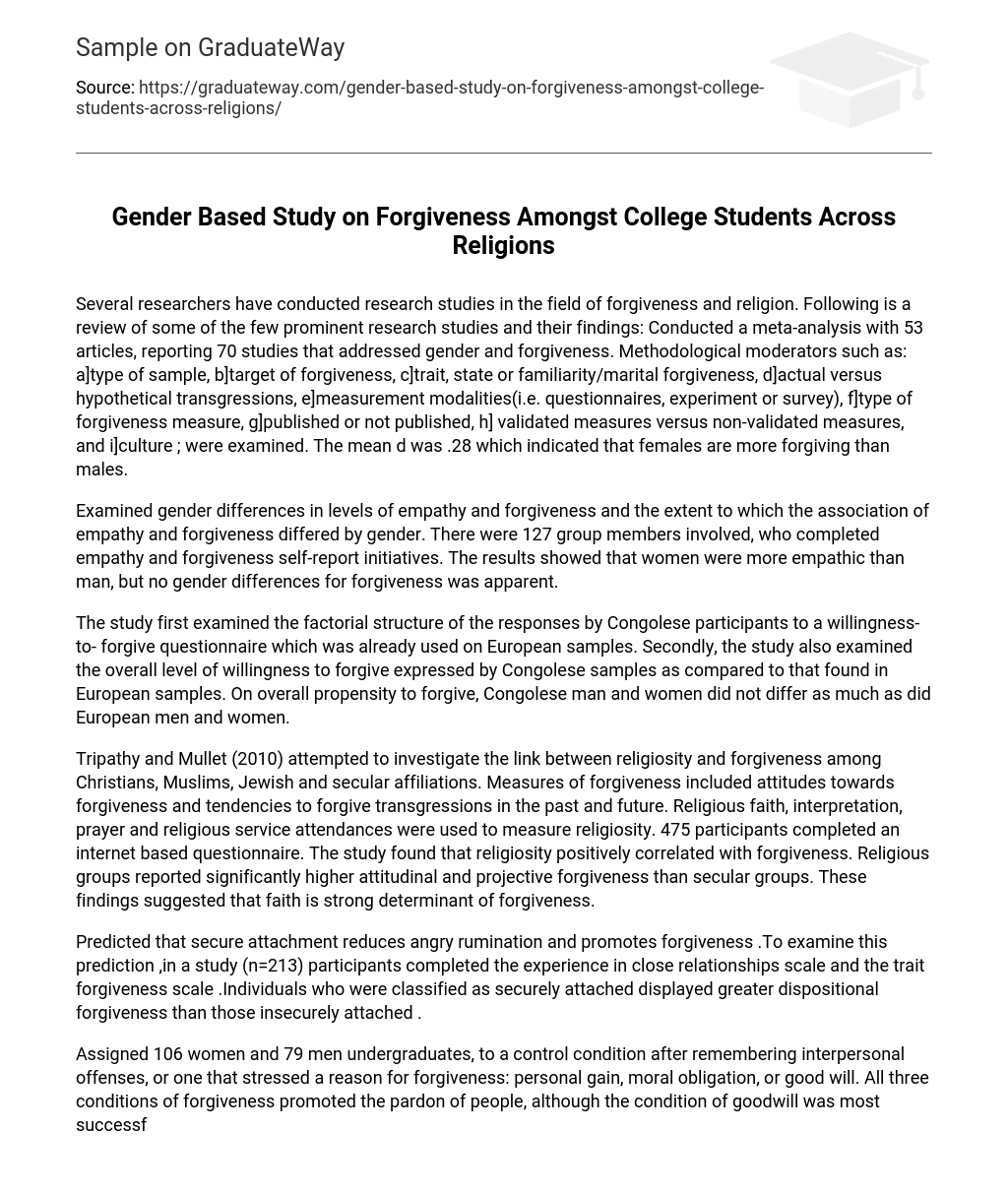Several researchers have conducted research studies in the field of forgiveness and religion. Following is a review of some of the few prominent research studies and their findings: Conducted a meta-analysis with 53 articles, reporting 70 studies that addressed gender and forgiveness. Methodological moderators such as: a]type of sample, b]target of forgiveness, c]trait, state or familiarity/marital forgiveness, d]actual versus hypothetical transgressions, e]measurement modalities(i.e. questionnaires, experiment or survey), f]type of forgiveness measure, g]published or not published, h] validated measures versus non-validated measures, and i]culture ; were examined. The mean d was .28 which indicated that females are more forgiving than males.
Examined gender differences in levels of empathy and forgiveness and the extent to which the association of empathy and forgiveness differed by gender. There were 127 group members involved, who completed empathy and forgiveness self-report initiatives. The results showed that women were more empathic than man, but no gender differences for forgiveness was apparent.
The study first examined the factorial structure of the responses by Congolese participants to a willingness-to- forgive questionnaire which was already used on European samples. Secondly, the study also examined the overall level of willingness to forgive expressed by Congolese samples as compared to that found in European samples. On overall propensity to forgive, Congolese man and women did not differ as much as did European men and women.
Tripathy and Mullet (2010) attempted to investigate the link between religiosity and forgiveness among Christians, Muslims, Jewish and secular affiliations. Measures of forgiveness included attitudes towards forgiveness and tendencies to forgive transgressions in the past and future. Religious faith, interpretation, prayer and religious service attendances were used to measure religiosity. 475 participants completed an internet based questionnaire. The study found that religiosity positively correlated with forgiveness. Religious groups reported significantly higher attitudinal and projective forgiveness than secular groups. These findings suggested that faith is strong determinant of forgiveness.
Predicted that secure attachment reduces angry rumination and promotes forgiveness .To examine this prediction ,in a study (n=213) participants completed the experience in close relationships scale and the trait forgiveness scale .Individuals who were classified as securely attached displayed greater dispositional forgiveness than those insecurely attached .
Assigned 106 women and 79 men undergraduates, to a control condition after remembering interpersonal offenses, or one that stressed a reason for forgiveness: personal gain, moral obligation, or good will. All three conditions of forgiveness promoted the pardon of people, although the condition of goodwill was most successful. The results revealed that women’s responses varied not in terms of circumstances. Another survey of undergraduates (106 men, 112 women) found that, before the study, women put more effort into forgiveness relative to men, and they were more likely to view forgiveness as a healing process.
Investigated forgiveness between post graduate students. Two hundred and forty students were selected from various departments of Karnataka University, Dharwad, using the Random Sampling Technique. Result showed that if students become more compassionate, they appear to be less revengeful and have a tendency to show less hostility, and have a tendency to show more empathy and conciliation. The disparity between male and female post-graduate students was found to be important. On forgiveness, female students displayed less sense of deceit and vengeance, and more feelings of benevolence towards the transgressor, and vice-versa.





